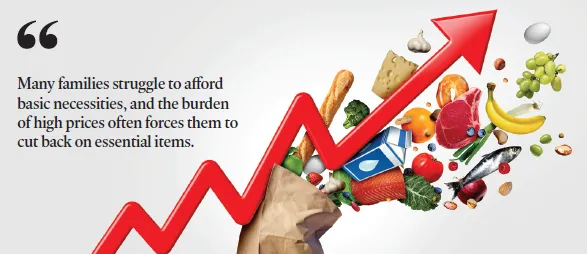Ramadhan, the holy month of fasting and reflection for Muslims, holds a special significance in Kashmir. However, in recent years, this auspicious period has been marred by price shocks, with essential commodities becoming increasingly expensive, especially for those already struggling to make ends meet.
Several factors contribute to price shocks during Ramadhan in Kashmir. One key factor is the increase in demand for essential commodities such as fruits, vegetables, and grains as families prepare for iftar, the meal to break their fast. This surge in demand often outstrips the available supply, leading to a spike in prices.
Moreover, disruptions in the supply chain, transportation bottlenecks, and hoarding by unscrupulous traders further exacerbate the situation. Additionally, inflationary pressures and market speculation play a role in driving up prices during this critical period.
The impact of these price shocks is deeply felt by the community, especially the poor and marginalised. Many families struggle to afford basic necessities, and the burden of high prices often forces them to cut back on essential items or rely on assistance from charitable organisations.
For the business community, especially small traders and vendors, the price shocks during Ramadan can have a significant impact on their livelihoods. The increased cost of goods can eat into their margins, making it difficult for them to sustain their businesses.
To address these challenges, the government needs to take proactive measures to stabilise prices and ensure the availability of essential commodities during Ramadan.
The government should closely monitor prices and take action against traders engaged in price gouging and hoarding. Efforts should be made to streamline the supply chain and address bottlenecks to ensure the smooth flow of goods.
The government’s public distribution system (PDS) should be strengthened to provide subsidized food grains and essential items to the needy.
Price shocks during Ramadan in Kashmir are a harsh reality that adds to the challenges faced by the community, especially the poor and vulnerable. Addressing these challenges requires a concerted effort from the government, civil society, and the business community to ensure that the spirit of Ramadan is not overshadowed by economic hardships.
Inflation, the persistent rise in prices, is a silent predator that stealthily erodes the purchasing power of individuals and destabilizes economies. In the context of Kashmir, this insidious force is taking a toll on the daily lives of its residents, posing a grave concern that demands immediate attention and effective measures to curb its impact.
In recent years, Kashmir has witnessed a steady uptick in inflation rates, primarily driven by factors such as supply chain disruptions, rising fuel prices, and geopolitical tensions. The situation has been exacerbated by the region’s unique geographical and political challenges, which have hindered the smooth flow of goods and services.
The impact of inflation is most acutely felt by the common man, whose hard-earned wages are being eroded by the relentless rise in prices. Basic necessities such as food, fuel, and healthcare have become increasingly unaffordable for many, pushing them deeper into poverty and uncertainty.
One of the major challenges in controlling inflation in Kashmir is the lack of effective mechanisms and institutions to monitor and regulate prices.
Addressing the issue of inflation in Kashmir requires a multi-pronged approach that involves both short-term interventions and long-term policy reforms. Immediate steps such as price controls on essential commodities, enhanced monitoring of markets, and crackdown on hoarding and profiteering can help alleviate the immediate burden on the common man.
Improving infrastructure and connectivity to facilitate smoother flow of goods and services.
Diversifying the economy to reduce dependency on volatile sectors. Strengthening regulatory frameworks to ensure fair competition and prevent market distortions.
A PRAYER
We Pray for those struggling to afford basic necessities: We pray for all those who are burdened by the increasing prices of food, shelter, and healthcare. May they find relief and support in their communities and through government assistance programs
We pray for wisdom and compassion for those in positions of authority, that they may enact policies and measures to address the root causes of price rise and ensure the well-being of all citizens, especially the most vulnerable.
We pray for businesses and employers, that they may act justly and ethically in their pricing practices, considering the impact on the lives of ordinary people.
We pray for a spirit of solidarity among all people, that we may be mindful of the needs of others and work together to create a more just and equitable society.
We pray for a conversion of hearts, that we may be moved to care for one another as brothers and sisters, sharing our resources and working for the common good.
(The author senior staffer Greater Kashmir)







